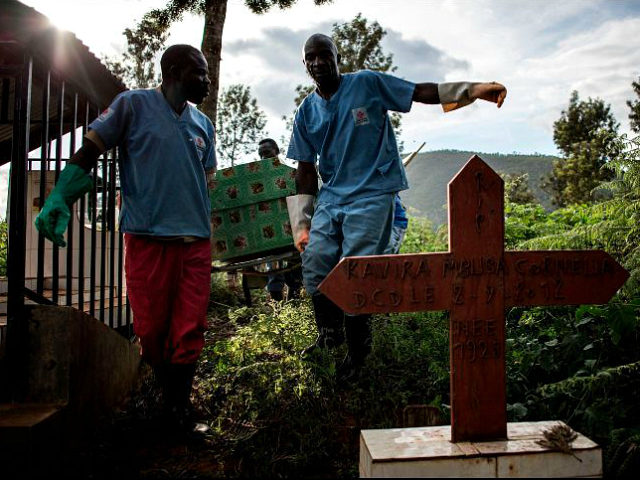High-security burials of Ebola victims from the worst outbreak of the virus ever experienced in the Democratic Republic of Congo (DRC) are keeping relatives at a distance, triggering anger and trauma among the central African country’s residents, the Agence France-Presse (AFP) news agency reported this week.
“This is a traumatic break with traditions that demand the body of a loved-one be seen or touched,” AFP noted, referring to the funerals, which the news agency reported to be “part of a hard-pressed strategy to roll back the disease.”
Under the current World Health Organization (WHO) rules, authorities bury anyone who succumbs to the highly infectious hemorrhagic fever in “carefully-controlled conditions” aimed at reducing the risk of infection from bodily fluids, AFP noted.
“But that means ceremonies are carried out in sanitized conditions, with relatives and friends kept at a distance – for many, a traumatic break with traditions that demand the body of a loved-one be seen or touched,” it added.
Seros Muyisa Kamathe, a local guide and interpreter, highlighted the culture shock associated with the new funeral rules when speaking to AFP.
“The custom is that the body of the deceased first returns to the home. And once people have mourned, they have the chance to touch the body for the last time,” Kamathe declared.
“Before going to the cemetery, you open the coffin so people can take one last look at the deceased,” the local guide added.
Since authorities announced it last August, the Ebola epidemic in the DRC, the tenth in recent years, has infected 1,847 people, including the record 1,223 who likely died, the WHO revealed in its latest report, Voice of America (VOA) reported.
Health authorities first observed Ebola in the DRC in 1976. It is named after a local river.
The DRC’s outbreak is the second deadliest in Africa after an epidemic claimed the lives of more than 11,300 people in the Western part of the continent between 2014 and 2016.
WHO implemented a 12-step Ebola funeral protocol to keep the handling of the remains at a minimum. However, it also emphasizes the importance of respect for relatives and mourning.
“The burial process is very sensitive for the family and the community and can be the source of trouble or even open conflict,” the United Nations agency primarily funded by the United States acknowledges.
Authorities are not to begin any funeral without the consent of the victim’s family, the WHO reportedly said, adding that health workers should engage with locals “for prayers to dissipate tensions and provide respectful time,” it says.
AFP noted
The burial process is part of the notoriously time-consuming and labor-intensive task of combatting Ebola. And in this troubled region, the challenge has been further complicated by bloody deadly attacks on Ebola treatment centers by local militias.
At the opening of the organizations’ annual assembly on Monday, WHO Director-General Tedros Adhanom Ghebreyesus described the outbreak as “one of the most complex health emergencies any of us have ever faced,” according to several news outlets.
“We are not just fighting a virus,” he stressed. “We’re fighting insecurity. We’re fighting violence. We’re fighting misinformation … and we’re fighting the politicization of an outbreak.”
Congo’s minister of health, Oly Ilunga Kalenga, said the DRC must continually adapt and change its strategy for dealing with the outbreak.
“He said prevention measures, surveillance, the tracing of infected people, timely treatment and safe burial practices must be maintained. At the same time, he said old tools need to be refreshed and improved,” VOA reported.

COMMENTS
Please let us know if you're having issues with commenting.